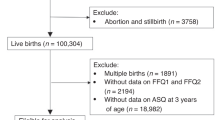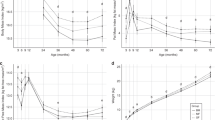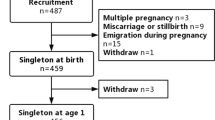Abstract
Background
Although the deleterious effect of micronutrient deficiency at sensitive periods on neurodevelopment is well established, the potential influence of macronutrient intake on early life neurodevelopment of healthy term infants has been seldomly studied. We aimed to explore whether macronutrient intake at 12 months was related to neurodevelopmental scores in preschool children.
Methods
Analyses were based on data from the EDEN mother-child cohort. Macronutrient intake was assessed by 3-day food records at 12 months of age. Neurodevelopment was assessed at 3 years using the French version of the Ages and Stages Questionnaire (ASQ) (n = 914), and at 5–6 years, using the French version of the Wechsler Preschool and Primary Scale of Intelligence—Third Edition (n = 785). An association between macronutrient intake and neurodevelopmental scores were analysed by multivariable linear regression for 3-year Full Score ASQ or 5–6-year intelligence quotient scores and multivariable logistic regression for 3-year ASQ subdomains.
Results
Macronutrient intake in infancy was not associated with neurodevelopmental scores in preschool children. No association was found between PUFA intake and overall neurodevelopmental scores, after accounting for multiple testing.
Conclusion
In the present study, macronutrient intake at one year did not appear to influence the child’s cognitive ability at 3 and 5–6 years. Further studies are needed to clarify the relationship between early fatty acid intake and neurodevelopment.
This is a preview of subscription content, access via your institution
Access options
Subscribe to this journal
Receive 12 print issues and online access
$259.00 per year
only $21.58 per issue
Buy this article
- Purchase on Springer Link
- Instant access to full article PDF
Prices may be subject to local taxes which are calculated during checkout

Similar content being viewed by others
Data availability
The data underlying the findings cannot be made freely available for ethical and legal restrictions imposed, because this study includes a substantial number of variables that, together, could be used to re-identify the participants based on a few key characteristics and then be used to have access to other personal data. Therefore, the French ethics authority strictly forbids making these data freely available. However, they can be obtained upon request from the EDEN principal investigator. Readers may contact barbara.heude@inserm.fr to request the data. The analytic code will be made available upon request pending application and approval.
References
Garon N, Bryson SE, Smith IM. Executive function in preschoolers: a review using an integrative framework. Psychol Bull. 2008;134:31–60.
Schwarzenberg SJ, Georgieff MK, Daniels S, Corkins M, Golden NH, Kim JH, et al. Advocacy for improving nutrition in the first 1000 days to support childhood development and adult health. Pediatrics. 2018;141:e20173716.
Gilmore JH, Knickmeyer RC, Gao W. Imaging structural and functional brain development in early childhood. Nat Rev Neurosci. 2018;19:123–37.
de Lauzon-Guillain B, Marques C, Kadawathagedara M, Bernard JY, Tafflet M, Lioret S, et al. Maternal diet during pregnancy and child neurodevelopment up to age 3.5 years: the nationwide Étude Longitudinale Française depuis l’Enfance (ELFE) birth cohort. Am J Clin Nutr. 2022;116:1101–11.
Freitas-Vilela AA, Pearson RM, Emmett P, Heron J, Smith ADAC, Emond A, et al. Maternal dietary patterns during pregnancy and intelligence quotients in the offspring at 8 years of age: Findings from the ALSPAC cohort. Matern Child Nutr. 2018;14:e12431.
Horta BL, Loret de Mola C, Victora CG. Breastfeeding and intelligence: a systematic review and meta-analysis. Acta Paediatr. 2015;104:14–9.
Lam LF, Lawlis TR. Feeding the brain—the effects of micronutrient interventions on cognitive performance among school-aged children: a systematic review of randomized controlled trials. Clin Nutr. 2017;36:1007–14.
Nyaradi A, Oddy WH, Hickling S, Li J, Foster JK. The relationship between nutrition in infancy and cognitive performance during adolescence. Front Nutr. 2015;2:2.
Nyaradi A, Foster JK, Hickling S, Li J, Ambrosini GL, Jacques A, et al. Prospective associations between dietary patterns and cognitive performance during adolescence. J Child Psychol Psychiatry. 2014;55:1017–24.
Haapala EA, Eloranta A-M, Venäläinen T, Schwab U, Lindi V, Lakka TA. Associations of diet quality with cognition in children—the Physical Activity and Nutrition in Children study. Br J Nutr. 2015;114:1080–7.
Sammallahti S, Kajantie E, Matinolli H-M, Pyhälä R, Lahti J, Heinonen K, et al. Nutrition after preterm birth and adult neurocognitive outcomes. PloS One. 2017;12:e0185632.
Escribano J, Luque V, Canals-Sans J, Ferré N, Koletzko B, Grote V, et al. Mental performance in 8-year-old children fed reduced protein content formula during the 1st year of life: safety analysis of a randomised clinical trial. Br J Nutr. 2019;122:S22–30.
Timby N, Domellöf E, Hernell O, Lönnerdal B, Domellöf M. Neurodevelopment, nutrition, and growth until 12 mo of age in infants fed a low-energy, low-protein formula supplemented with bovine milk fat globule membranes: a randomized controlled trial. Am J Clin Nutr. 2014;99:860–8.
Timby N, Adamsson M, Domellöf E, Grip T, Hernell O, Lönnerdal B, et al. Neurodevelopment and growth until 6.5 years of infants who consumed a low-energy, low-protein formula supplemented with bovine milk fat globule membranes: a randomized controlled trial. Am J Clin Nutr. 2021;113:586–92.
Naveed S, Venäläinen T, Eloranta AM, Erkkilä AT, Jalkanen H, Lindi V, et al. Associations of dietary carbohydrate and fatty acid intakes with cognition among children. Public Health Nutr. 2020;23:1657–63.
Hassevoort KM, Lin AS, Khan NA, Hillman CH, Cohen NJ. Added sugar and dietary fiber consumption are associated with creativity in preadolescent children. Nutr Neurosci. 2020;23:791–802.
Starling P, Charlton K, McMahon AT, Lucas C. Fish intake during pregnancy and foetal neurodevelopment—a systematic review of the evidence. Nutrients. 2015;7:2001–14.
Lehner A, Staub K, Aldakak L, Eppenberger P, Rühli F, Martin RD, et al. Fish consumption is associated with school performance in children in a non-linear way: results from the German cohort study KiGGS. Evol Med Public Health. 2019;2020:2–11.
Verfuerden ML, Dib S, Jerrim J, Fewtrell M, Gilbert RE. Effect of long-chain polyunsaturated fatty acids in infant formula on long-term cognitive function in childhood: a systematic review and meta-analysis of randomised controlled trials. PloS One. 2020;15:e0241800.
Emery S, Häberling I, Berger G, Walitza S, Schmeck K, Albert T, et al. Omega-3 and its domain-specific effects on cognitive test performance in youths: a meta-analysis. Neurosci Biobehav Rev. 2020;112:420–36.
Heude B, Forhan A, Slama R, Douhaud L, Bedel S, Saurel-Cubizolles M-J, et al. Cohort Profile: The EDEN mother-child cohort on the prenatal and early postnatal determinants of child health and development. Int J Epidemiol. 2015;45:353–63.
Ego A, Prunet C, Blondel B, Kaminski M, Goffinet F, Zeitlin J. Courbes de croissance in utero ajustées et non ajustées adaptées à la population française. II – Comparaison à des courbes existantes et apport de l’ajustement. J Gynecol Obstet Biol Reprod. 2016;45:165–76.
Deschamps V, de Lauzon-Guillain B, Lafay L, Borys JM, Charles MA, Romon M. Reproducibility and relative validity of a food-frequency questionnaire among French adults and adolescents. Eur J Clin Nutr. 2009;63:282–91.
Betoko A, Charles MA, Hankard R, Forhan A, Bonet M, Saurel-Cubizolles MJ, et al. Infant feeding patterns over the first year of life: influence of family characteristics. Eur J Clin Nutr. 2013;67:631–7.
Yuan WL, Nicklaus S, Lioret S, Lange C, Forhan A, Heude B, et al. Early factors related to carbohydrate and fat intake at 8 and 12 months: results from the EDEN mother–child cohort. Eur J Clin Nutr. 2017;71:219–26.
Squires J, Bricker D. Ages & stages questionnaires ® (ASQ- 3TM): user’s guide—a parent-completed child monitoring system. 3rd ed 2009.
Wechsler D. Wechsler Preschool and Primary Scale of Intelligence. 3rd ed 2002.
Frankenburg WK, Coons CE. Home screening questionnaire: its validity in assessing home environment. J Pediatr. 1986;108:624–6.
Shrier I, Platt RW. Reducing bias through directed acyclic graphs. BMC Med Res Methodol. 2008;8:70.
Azur MJ, Stuart EA, Frangakis C, Leaf PJ. Multiple imputation by chained equations: what is it and how does it work? Int J Methods Psychiatr Res. 2011;20:40–9.
Benjamini Y, Hochberg Y. Controlling the false discovery rate: a practical and powerful approach to multiple testing. J R Stat Soc: Ser B (Methodol). 1995;57:289–300.
R Core Team. R: a language and environment for statistical computing. R Foundation for Statistical Computing. Vienna, Austria 2018.
van Buuren S, Groothuis-Oudshoorn K. mice: multivariate imputation by chained equations in R. J Stat Softw. 2011;45:1–67.
Lesnoff M, Lancelot R. aod: analysis of overdispersed Data. 2012.
Georgieff MK. Nutrition and the developing brain: nutrient priorities and measurement. Am J Clin Nutr. 2007;85:614S–20S.
Muth A-K, Park SQ. The impact of dietary macronutrient intake on cognitive function and the brain. Clin Nutr. 2021;40:3999–4010.
Isaacs EB, Morley R, Lucas A. Early diet and general cognitive outcome at adolescence in children born at or below 30 weeks gestation. J Pediatr. 2009;155:229–34.
Larson LM, Yousafzai AK. A meta-analysis of nutrition interventions on mental development of children under-two in low- and middle-income countries. Matern Child Nutr. 2017;13(1):e12229.
Parikh P, Semba R, Manary M, Swaminathan S, Udomkesmalee E, Bos R, et al. Animal source foods, rich in essential amino acids, are important for linear growth and development of young children in low- and middle-income countries. Matern Child Nutr. 2022;18:e13264.
Cohen JFW, Gorski MT, Gruber SA, Kurdziel LBF, Rimm EB. The effect of healthy dietary consumption on executive cognitive functioning in children and adolescents: a systematic review. Br J Nutr. 2016;116:989–1000.
Ruys CA, Bröring T, van Schie PEM, van de Lagemaat M, Rotteveel J, Finken MJJ, et al. Neurodevelopment of children born very preterm and/or with a very low birth weight: 8-Year follow-up of a nutritional RCT. Clin Nutr ESPEN. 2019;30:190–8.
Hortensius LM, Janson E, van Beek PE, Groenendaal F, Claessens NHP, Swanenburg de Veye HFN, et al. Nutritional intake, white matter integrity, and neurodevelopment in extremely preterm born infants. Nutrients 2021;13:3409.
Embleton ND, Wood CL, Pearce MS, Brunskill G, Grahame V. Early diet in preterm infants and later cognition: 10-year follow-up of a randomized controlled trial. Pediatr Res. 2021;89:1442–6.
Jasani B, Simmer K, Patole SK, Rao SC. Long chain polyunsaturated fatty acid supplementation in infants born at term. Cochrane Database Syst Rev. 2017;10(3),13–16.
Beyerlein A, Hadders-Algra M, Kennedy K, Fewtrell M, Singhal A, Rosenfeld E, et al. Infant formula supplementation with long-chain polyunsaturated fatty acids has no effect on bayley developmental scores at 18 months of age—IPD meta-analysis of 4 large clinical trials. J Pediatr Gastroenterol Nutr. 2010;50:79–84.
Bernard JY, De Agostini M, Forhan A, de Lauzon-Guillain B, Charles MA, Heude B. The dietary n6:n3 fatty acid ratio during pregnancy is inversely associated with child neurodevelopment in the EDEN mother-child cohort. J Nutr. 2013;143:1481–8.
Sheppard KW, Cheatham CL. Omega-6 to omega-3 fatty acid ratio and higher-order cognitive functions in 7- to 9-y-olds: a cross-sectional study. Am J Clin Nutr. 2013;98:659–67.
Troude P, Squires J, L’Hélias LF, Bouyer J, LA Rochebrochard ED. Ages and stages questionnaires: feasibility of postal surveys for child follow-up. Early Hum Dev. 2011;87:671–6.
Charkaluk M-L, Rousseau J, Calderon J, Bernard JY, Forhan A, Heude B, et al. Ages and stages questionnaire at 3 years for predicting iq at 5–6 years. Pediatrics. 2017;139(4):e20162798.
de Oliveira KHD, de Almeida GM, Gubert MB, Moura AS, Spaniol AM, Hernandez DC, et al. Household food insecurity and early childhood development: Systematic review and meta-analysis. Matern Child Nutr. 2020;16:e12967.
Acknowledgements
This study was developed in the scope of the InfaDiet project (ANR grant no.: ANR-19-CE36-0008). This study was supported by the Epidemiology Research Unit- Institute of Public Health of University of Porto (ISPUP-EPIUnit/ISPUP/UP) (financed by national funding from FCT—UIBD/04750/2020), and by a PhD Individual Grant SFRH/BD/147822/2019 (ARM), funded by the Foundation for Science and Technology – FCT (Portuguese Ministry of Education and Science). The EDEN study was supported by the Fondation pour la Recherche Médicale (FRM), French Ministry of Research: Federative Research Institutes and Cohort Program, INSERM Human Nutrition National Research Program, and Diabetes National Research Program (by a collaboration with the French Association of Diabetic Patients [AFD]), French Ministry of Health, French Agency for Environment Security (AFSSET), French National Institute for Population Health Surveillance (InVS), Paris‐Sud University, French National Institute for Health Education (INPES), Nestlé, Mutuelle Générale de l’Education Nationale (MGEN), French‐speaking Association for the Study of Diabetes and Metabolism (ALFEDIAM), National Agency for Research (ANR non‐thematic programme), and National Institute for Research in Public Health (IRESP: TGIR 2008 cohort in health programme).
Author information
Authors and Affiliations
Contributions
ARM wrote the initial draft, performed data analysis, and had the final approval of the version to be published. DC contributed to statistical analysis and data interpretation. CL contributed to the conception of the study and interpretation of data. BdL-G supervised the analysis plan, assisted the statistical analysis and data interpretation. BH was responsible of the EDEN mother-child cohort. BH and JB were involved in collection, cleaning, and interpretation of the data. All authors reviewed drafts, provided critical feedback, read, and approved the final manuscript and were responsible for the final content of the paper.
Corresponding author
Ethics declarations
Competing interests
The authors declare no competing interests.
Additional information
Publisher’s note Springer Nature remains neutral with regard to jurisdictional claims in published maps and institutional affiliations.
Supplementary information
Rights and permissions
Springer Nature or its licensor (e.g. a society or other partner) holds exclusive rights to this article under a publishing agreement with the author(s) or other rightsholder(s); author self-archiving of the accepted manuscript version of this article is solely governed by the terms of such publishing agreement and applicable law.
About this article
Cite this article
Marinho, A.R., Correia, D., Bernard, J.Y. et al. Macronutrient intake during infancy and neurodevelopment in preschool children from the EDEN mother–child cohort. Eur J Clin Nutr 77, 668–676 (2023). https://doi.org/10.1038/s41430-023-01273-z
Received:
Revised:
Accepted:
Published:
Issue Date:
DOI: https://doi.org/10.1038/s41430-023-01273-z



